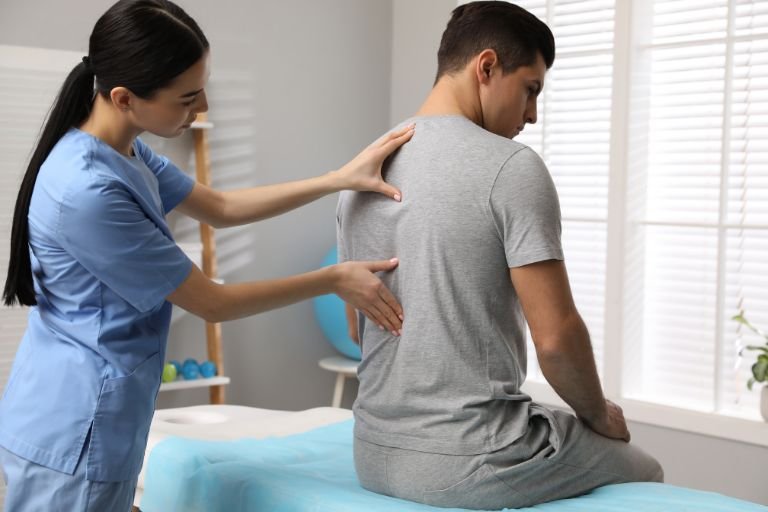- Fitwell Physiotherapy
Sports Injury

Sports injuries are physical injuries that occur during exercise or while participating in sports. They can affect bones, muscles, ligaments, and tendons and range from mild to severe.
Please submit your details below.
Symptoms
- Pain: Immediate or delayed onset pain in the affected area.
- Swelling: Inflammation and fluid buildup around the injured site.
- Bruising: Discoloration of the skin due to internal bleeding.
- Limited Range of Motion: Difficulty moving the affected joint or limb.
- Weakness: Reduced strength in the injured area.
- Tenderness: Sensitivity when touching or applying pressure to the injured area.
Causes
- Overuse: Repetitive stress on muscles, joints, and soft tissues.
- Direct Impact: Blows or collisions during contact sports.
- Improper Technique: Poor form during physical activity.
- Insufficient Warm-Up: Lack of proper stretching and warm-up exercises.
- Inadequate Equipment: Using faulty or inappropriate sports gear.
- Fatigue: Increased risk when the body is tired and coordination is compromised.
When to See a Physiotherapist
- Persistent Pain: If pain continues for more than a few days.
- Severe Swelling: Immediate, extensive swelling that doesn’t subside.
- Reduced Mobility: Inability to move the affected area normally.
- Recurrent Injury: Repeated issues in the same area.
- Post-Surgery: After an operation for rehabilitation and recovery.
- Chronic Issues: Long-term discomfort or dysfunction affecting performance.
Risks
- Age: Older athletes are more prone to injuries due to wear and tear.
- Previous Injuries: History of past injuries can increase susceptibility.
- Intense Training: High-intensity workouts without adequate rest.
- Poor Conditioning: Lack of strength, flexibility, and endurance training.
- Neglecting Warm-Up/Cool-Down: Skipping essential pre- and post-exercise routines.
- Playing Through Pain: Ignoring minor injuries that can worsen over time.
How to Prevent
- Proper Warm-Up and Cool-Down: Engage in dynamic stretches before and static stretches after exercise.
- Use Correct Technique: Learn and maintain proper form during activities.
- Wear Appropriate Gear: Use well-fitting, sport-specific equipment.
- Stay Hydrated: Maintain fluid balance to support muscle function.
- Strength and Conditioning: Incorporate exercises that enhance overall physical fitness.
- Listen to Your Body: Rest and recover if you feel pain or discomfort.
Treatments
- R.I.C.E. Method: Rest, Ice, Compression, and Elevation to manage acute injuries.
- Physical Therapy: Exercises and treatments designed to restore function and mobility.
- Medication: Anti-inflammatory drugs to reduce pain and swelling.
- Surgery: In severe cases, surgical intervention may be required.
- Massage Therapy: Helps to alleviate muscle tension and improve circulation.
- Rehabilitation Programs: Structured plans to rebuild strength, flexibility, and endurance.
- Bracing/Taping: Supportive devices to stabilize injured areas.
Conclusion
Understanding the symptoms, causes, and risks associated with sports injuries is crucial for prevention and effective treatment. Early intervention by a physiotherapist can significantly enhance recovery and reduce the risk of long-term complications. Adopting preventive measures, such as proper technique and adequate conditioning, can help athletes stay injury-free and maintain optimal performance.
Frequently Asked Questions
Foot pain can result from various factors, including:
- Plantar fasciitis: inflammation of the tissue connecting the heel to the toes.
- Achilles tendonitis: inflammation of the Achilles tendon at the back of the heel.
- Morton’s neuroma: thickening of tissue around a nerve between the toes.
- Bunions or hammertoes: deformities of the foot bones.
- Sprains, strains, or fractures.
- Arthritis.
- Overuse or repetitive stress injuries.
- Ill-fitting shoes or poor footwear choices.
Physiotherapy can offer various treatments to alleviate foot pain, including:
- Manual therapy techniques like massage and joint mobilization to reduce pain and improve joint mobility.
- Strengthening and stretching exercises to improve foot and ankle strength, flexibility, and stability.
- Gait analysis and correction to address abnormal walking patterns contributing to foot pain.
- Custom orthotics or footwear recommendations to provide support and relieve pressure on affected areas.
- Modalities such as ultrasound or electrical stimulation to reduce inflammation and promote healing.
You should consider seeking physiotherapy if foot pain:
- Persists for more than a few days despite rest and home remedies.
- Interferes with daily activities or mobility.
- Is severe or accompanied by swelling, redness, or signs of infection.
- Recurs frequently or worsens over time.
- Is associated with a recent injury or trauma.
At-home remedies to relieve foot pain include:
- Resting and elevating the affected foot.
- Applying ice packs to reduce inflammation.
- Taking over-the-counter pain medications.
- Stretching and massaging the foot.
- Wearing supportive footwear with cushioned insoles.
- Avoiding activities that exacerbate the pain.
Preventive measures to reduce the risk of foot pain include:
- Wearing properly fitted shoes with adequate support.
- Maintaining a healthy weight to reduce pressure on the feet.
- Gradually increasing physical activity to avoid overuse injuries.
- Stretching and strengthening exercises for the feet and ankles.
- Regularly inspecting the feet for signs of irritation or injury.
Related Symptoms
How Fitwell Physiotherapy Can Help?
Dr. Richa’s Fitwell physiotherapy has an extensive team of physiotherapists all within their own specialist areas of physiotherapy. Whatever your condition, we guarantee that we will have the best physiotherapist for you. We assess, diagnose, plan, cure and care for you.
Fitwell Physiotherapy Clinic, Pune provides you best physiotherapy treatment in Kharadi, pune. We also serve Chandan Nagar, Vadgaon Sheri, Keshav Nagar, Wagholi & nearby Areas in Pune. We are experts in treating Neck Pain, Hand Pain, Back Pain, Lower Back Pain, Knee Pain, Stiff Neck, Sciatica, Arthritis, Stroke Paralysis & Post Surgical Rehab.
We provide Specialized physiotherapy treatments in Sports Injuries, Pre and post Surgery, Neurologic, Pediatric, Chronic Pain/Fatigue, Rheumatology, Women’s Health, Men’s Health, Ergonomics, Vestibular, Amputees & all sort of Pain treatment and lifestyle conditions.
































